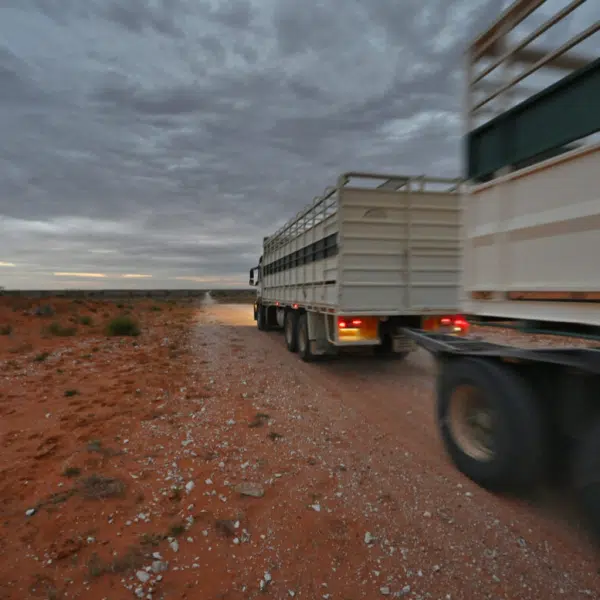In July 2023 we took the opportunity to provide a submission to the Queensland Government public works inquiry into the state-controlled roads between Birdsville, Bedourie and Windorah.
About OBE Organic
OBE Organic® produces the world’s best organic beef. We began in the 1990s as Australia’s first and only premium meat exporter 100% dedicated to the production of organic beef. Our mission is to help people lead better, healthier lives.
Formed by a group of far-sighted pastoral families in Thargomindah, QLD, our company was founded on century old traditions – raising cattle exactly the way nature intended. No chemicals, no pollutants, no hormones, nothing, except a whole-hearted commitment to letting the most enriching natural forces and environment produce the very best grass-fed organic beef.
OBE Organic contract processes fresh, chilled and frozen organic beef at a modern processing facility on the east coast of Australia. Our certified organic beef is available to grocery retailers, butcheries, restaurants and food service customers in the USA, Middle East, Asia and Australia.
Our Production Region
Our cattle are sourced from the pure and remote heart of Australia. It’s a place where logistics and connectivity are challenging, given the remoteness of the area and vast distance to reach regional hubs.
Outback towns like Quilpie, Windorah, Birdsville, Bedourie and Boulia are small but vital staging posts into our production region. Our free-range production operation is staggering. Together, our family farmers own over 8 million hectares of grazing land. That’s almost 20 million acres – about the area of Tasmania.

OBE Organic supplies beef to consumers 52 weeks a year and we need roads that are passable after a little bit of weather. We export much of our product to 15 different countries. Last financial year, wet, unsealed roads meant we were unable to move livestock to the processing facility on multiple occasions. This example reduced OBE Organic’s, and therefore Australia’s exports by around $3Million. By extrapolating our example, across multiple exporting businesses, there is a significant lost opportunity for Queensland and Australian exporters on the world stage.
Our Business Considerations
Our Sustainability Report 2023/2024 provides a snapshot of our efforts to deliver on our mission. The report shows that we take our commitment to people, animals, the environment and our product seriously. Whether you are responsible for moving cattle or people or goods or resources about the remote Outback, businesses have common needs.
Compliance: We need to comply with State and Federal Government Legislation like Chain of Responsibility (COR) as outlined within the Heavy Vehicle National Law (HVNL), Work Health & Safety Regulations (WHS Regulation), Animal Welfare Standards & Guidelines – Land Transport of Livestock and relevant codes of practise.
Paper-based National Vendor Declarations (NVDs) are used to declare necessary information about the food safety status of the livestock we purchase.
Traceability: The ability to trace livestock from property of birth to slaughter is critical for businesses like ours, which are compliant to the Export Control Act. We use technology like RFID tags to identify our animals.
Transparency: Internationally agreed upon frameworks like the Global Round Table for Sustainable Beef and the UN Sustainability Development Goals (SDGs), recognise transparency as key to meeting our social license to operate in years to come.
Future focus: In 2023 and beyond, improving supply chain resilience, growing and diversifying export markets, mitigating risk and harnessing opportunity will be key for OBE Organic, as the world collectively looks to recover from the business impacts of the Covid-19 pandemic.
OBE Organic has committed to the following:
- Encouraging State & Federal Governments to adopt policy supportive of our industry
- Contribute to the sharing of best practices across our industry
- Provide informed opinion to encourage constructive debate on industry matters
- Nurturing existing and developing new relationships with stakeholders
- Committing to capability development and training at all levels in our organisation
- Maintaining positive working relationships with relevant Peak Industry Bodies to influence policy positions.
- Participate in relevant trials of new technologies.
We’re mindful of the challenges the world faces to feed a rapidly growing population expected to reach nine billion people by 2050. For over 25 years, we’ve been developing competence and expertise in the management of a global organic beef supply chain that originates in the pure heart of Australia. It’s why we’ve taken this opportunity to provide a submission to the public works inquiry into the state-controlled roads between Birdsville and Bedourie and from Birdsville to Windorah.

But before we start. Let’s be clear. It’s not all about beef.
Towns like Quilpie, Windorah and Boulia are not just gateways to the vast cattle production region of the Channel Country, they are tourist hubs as well.
The Big Red Bash, Simpson Desert Ultra Marathon, Birdsville Races, Boulia Camel Races, Channel Country Ladies Day, Bedouries Races & Rodeo, Betoota Races, Windorah Yabby Races and the Outback Golf Masters are just a handful of the events which bring tens of thousands of people instead of cattle into and out of our production region. There is a significant surge of people moving about and spending money in the tourist season, bringing benefit to regional communities.
The problem
- Hundreds of kilometres of the Windorah – Birdsville Road remains unsealed.
- A portion of the Birdsville – Bedourie Road remains unsealed.
○ 15mm of rain to the region on a sealed road, is unlikely to close it or close it for as long as 15mm of rain on an unsealed road.
- Rain events lead to road closures which impact the movement of people, animals and supplies. Impacts can be significantly worse during the tourist season. Here are some media articles about the impact of rain events on our roads.
○ Outback Queensland towns Bedourie, Birdsville cut off by floodwater, groceries flown in – ABC News
○ Birdsville currently accessible only from the north | Queensland Country Life | QLD
- There are several creeks and gullies which, when they are running, hold up the movement of people, animals and supplies during rain events. It depends on where the rain falls, for how long and how much, as to how long the creeks run. In wintertime, there is less certainty as to when the creeks will dry out and become passable again.
- Some vehicles don’t want to share the road with trucks.
- There is limited mobile-phone coverage, a patchy UHF network and unreliable sat phone coverage on the state-controlled roads between Birdsville and Bedourie and from Birdsville to Windorah.

The solutions
- We recommend the Queensland Government improve the trafficability of the existing road network through investments in bitumen, including appropriate overtaking lanes and causeways to ensure we can use our roads 24/7.
- Additional, significant and timely investment in road maintenance (on roads which are currently unsealed) immediately after major events like the Big Red Bash and the Birdsville Races, should be an immediate priority.
- Regard should be given to communications for stakeholders using the Windorah – Birdsville Road & Birdsville – Bedourie Road. Consideration should be given to more rest areas, providing mobile coverage, like the stop at The Dreamtime Serpent, where mobile coverage is available.
- Better signage is required to educate motorists about sharing the roads with trucks. (Refer Case Study 1)
- Better signage is required to educate motorists about overtaking on outback roads. (Refer Case Study 2)
- Whether you are in the business of beef or tourism, resources, disaster management or Local Government, the business case for investment in our road networks should be broadened to consider the perspective of, or impact on, products and animals, as well as people. (Refer Case Study 3 and Refer Case Study 4)
- Improved maintenance of UHF Repeaters (Refer Case Study 5)
- A more localised road reporting system is required for Western Queensland.
(Refer Case Study 6)
Future Opportunities with Better Regional Infrastructure & Connectivity
- Safer roads which are more accessible to more people and businesses, more often.
- More efficient supply chains.
- An increase in Australia’s export volumes
- Better performance reporting at a business, Local Government, State and Federal Government level.
- More and better use of CCTV for safety purposes.
- Better monitoring and compliance to manage biosecurity risks.
- Improved ability to selectively activate ‘surge’ capacity across digital infrastructure for major events or major disasters.
- The ability to move animals, products or people from one place to another with more and better compliance, safety and transparency.
- Decreased risk of Animal Welfare issues caused by the inability to move livestock off property when flooding rains further north in the Lake Eyre Basin Catchment, causes flooding to southern areas, that have not received local rain for pasture growth.
- Increased security of income for contractors and service providers that are unable to operate when roads are impassable.
- Improved health outcomes as communities have more and better access to Specialist services like the Heart of Australia ‘Heart Bus’ and the RFDS Dental Service.
Moving livestock in the tourist season
With thousands of vehicles, many of which are towing large caravans, on regional roads during tourist season, livestock transport is impacted by way of transit times.
During particularly large events like the Birdsville Races and the Big Red Bash, it is necessary to try to avoid hauling livestock on regional roads during the periods when vehicles are bumping into Birdsville and bumping out. Livestock movements must be coordinated to either cancel, delay or divert movements, to avoid interactions with vehicles attending major events, on unsealed roads.
Case Study #1 – Cars & Trucks on roads
Some cars don’t want to share the road with trucks.
We’ve heard of one circumstance where a truck and vehicle pulling a caravan came to a dead stop, facing each other, with the vehicle refusing to pull off the road to let the fully laden truck pass along the single lane bitumen. They were worried they would slide into the table drain and be unable to get out. The situation was only resolved when the truck driver negotiated that he would arrange to have the car and caravan pulled out of the drain, if they did slide into it.
For the vehicles with UHF radios, who do give way to the trucks on the Windorah – Birdsville Road, we understand that they communicate on Channel 40 by way of comments to the truck driver like, ‘It’s all yours. We’ll get out of the way.
Local Governments, Safety Bodies and concerned individuals have attempted to educate caravan towers on road etiquette, however, there is no guarantee that they are aware of the Best Practice when sharing roads with Heavy Vehicles. This increases the risk of accidents in remote areas.

Case Study #2 – Overtaking on dirt roads.
With a full load of cattle, livestock trucks will typically move at around 60km/hour or less, on unsealed roads. This is frustratingly slow for tourists, leading some to sit behind the truck and proceed inefficiently on their journey. This creates a long queue of traffic, which is held up due to their inability to overtake on the existing gravel roads.
Others will attempt to overtake the truck, leading to a high risk of an accident. When the wind is blowing left to right across the unsealed roads, vehicles attempting to overtake the truck on the right-hand side will be driving into a wall of dust. Essentially, they will have zero visibility as they overtake at speed. If a vehicle is coming in the other direction, there is a high chance of a head on collision.
To provide an overtaking opportunity in these circumstances, the only solution is for the truck to move to the right-hand side of the unsealed road, allowing the vehicle to overtake on the left-hand side of the road, to ensure a clear line of site during the overtaking maneuver. This is only possible when all drivers have UHF connection with the road train. Bitumen roads will provide safe overtaking opportunities.
Moving supplies in the tourist season
The Queensland Government must prioritise the movement of essential supplies on unsealed outback roads, which can be severely impacted by wet weather events.
Case Study #3 – Fuel logistics
Fuel supplies to Birdsville are typically hauled from Quilpie via Windorah to Birdsville. During tourist season, the fuel trucks haul more fuel, more often. During the Big Red Bash, they pull 3 trailers at time, each holding 30,000 Litres of fuel. It’s about 130 Tonne, per movement. During the Big Red Bash, approximately 5000 vehicles need to fill up in Birdsville.
To cater for the fuel needs of tourists during the Big Red Bash, approximately 300 000 Litres of fuel are needed in Birdsville and another 700 000 Litres are needed in feeder towns like Windorah, Bedourie and Boulia. 300 000 Litres would typically be delivered to Birdsville from Quilpie in three truck movements.
Last year, when rain closed the Windorah – Birdsville Road, the fuel truck had to travel from Quilpie up to Winton, across to Boulia and down to Bedourie and then Birdsville, to deliver fuel to the Birdsville community. That’s an awfully long round trip and at significant costs to business. Had the Windorah to Birdsville Road been all-weather & open, this detour could have been avoided.
Ahead of the Big Red Bash in July 2023, the first movement of 94,000 Litres of fuel was hauled to Birdsville from Quilpie. The Windorah – Birdsville Road was subsequently closed due to wet weather. This necessitated a significant change in arrangements, as the next two lots of fuel had to be hauled from Townsville via Bedourie to Birdsville. These examples come at a significant cost to business.
Case Study #4 – Essential Supplies
A fortnightly freight run currently operates out of Townsville, usually with two trailers. This service provides essential food supplies to towns enroute, including Longreach, Jundah, Windorah, Birdsville, Bedourie, Boulia and Winton. It also backhauls everything from broken down vehicles to recycling out of these small communities.
Last year, during the Birdsville Races, the Windorah – Birdsville Road closed, following local rain. The freight truck was enroute to Birdsville ex Townsville, to deliver essential supplies to racegoers. It was stopped in Windorah due to the road closure. On this occasion, it was necessary for the truck to divert north to Winton and further north to Mt Isa, before it could travel 685kms south to Birdsville.
In both these examples, the operators could have simply cancelled their runs, returned to base and restarted a week later after the roads had dried out. Fortunately, for the thousands of racegoers and bashers who were stranded in Birdsville, they found an alternate route into Birdsville.
A bitumen seal on the Windorah – Birdsville Road, plus higher causeways would;
- improve trafficability in wet weather
- reduce wear and tear on tyres and trailers for vehicles and trucks
- reduce pressure on truck drivers with regards to fatigue management
- avoid the pressure on stretched local operators to serve tourists who are stranded in the outback, due to wet weather and inaccessible roads.
Communications
There is limited mobile-phone coverage, a patchy UHF network and unreliable sat phone coverage in the Channel Country. When you don’t have the connectivity you need, operational decision-making is hindered, and lives can be lost, especially in summer when it’s hot and there are not many people about.
Case Study #5 – A car accident, 2 kms on the Windorah side of the Cadelga turnoff
In June 2023, a livestock hauler, fully laden with certified organic livestock, came across a single vehicle rollover on the Windorah – Birdsville Road. Unable to get a signal on his sat phone or connect with anyone via UHF, he could not call emergency services. His only option was to sit with the injured driver next to the wreck of her car and wait. When another car came across the accident, he left her in their capable hands and jumped back in his truck heading towards Betoota.
Down the road a bit, travelling in the opposite direction, heading west towards Birdsville, was a local station manager. He flagged him down and ask him to turn around and travel as quickly as possible back to Betoota, to raise the alarm. He knew that he would get their quicker than a truck fully laden with livestock.
We recommend the Committee consider the data and information which flows between stakeholders who use the Windorah-Birdsville and Birdsville – Bedourie roads and whether the communication infrastructure is adequate and maintained. Could this data and information be useful for safety, compliance, traceability, biosecurity or disaster risk management purposes, if it were more accessible?
Agricultural supply chains like ours contribute millions of dollars to the nation’s economy each year. Unfortunately, we have more real-time information coming to us from temperature trackers sitting in our boxed beef in a warehouse in Los Angeles or Jakarta, than we do from our supply chain in Australia.
The maintenance of UHF Repeaters is a shared responsibility between Local Governments, State Government and Private Landholders depending on the location and what agreements have been reached. It is not acceptable that private landholders or a remote Local Government should be responsible for maintaining a network that is essential for public safety.
Road Reporting
The current mechanism for reporting road closures is not always accurate.
Case Study #6 – Road Condition Information – QLDTraffic
In early July 2023, during the Big Red Bash, the Queensland Government’s traffic website www.qldtraffic.qld.gov.au listed the Birdsville – Bedourie Road as closed to all traffic. In fact, this was the only road that was open into Birdsville. When you have 5000+ tourist vehicles heading to the Big Red Bash, road users need accurate information on the condition of roads in order to make informed decisions. A more localised road reporting system for Western Queensland would solve this issue. The Queensland Government Department of Transport & Main Roads should ensure that, within all remote Local Governments, there is an approved inspector of Main Roads to avoid having to rely on an employee being tasked from other areas such as Toowoomba.
Health & Wellbeing
The community of Birdsville is distinctly disadvantaged when compared to similar-sized communities with all-weather road access. Specialist services like the Heart of Australia ‘Heart Bus’ and the RFDS Dental Service cannot reach Birdsville due to the condition of the unsealed roads between Birdsville and Bedourie and Birdsville and Windorah.


The challenges with Queensland’s Regional Road infrastructure, for supply chains like ours, is not limited to the Windorah – Birdsville and Birdsville – Bedourie Roads
We recommend that the Queensland Government take this opportunity to consider the improvements which are necessary for safety purposes, to the Charleville – Quilpie and Quilpie – Windorah Roads.
- The width of the bitumen on the road is too narrow in parts, for the white line which has been painted down the middle. It is not possible for a truck and vehicle to pass safely, whilst both vehicles attempt to stay 100% on the bitumen. A reasonable person would assume that if they stayed to the left of the white line and the other vehicle stayed to the right of the white line, then they would be able to pass safely, whilst remaining entirely on the bitumen. This is not the case.
- On the Quilpie – Windorah Road, the width of the bitumen on the road is too narrow in parts, for a road which has been built up very high. When it gets wet, tourists do not want to move off the bitumen to allow the trucks to pass as they are scared that they will slide into the table drain.
- On the Quilpie – Windorah Road, there is a corner about 80kms from Windorah, which if you come around at pace, could be deadly.









